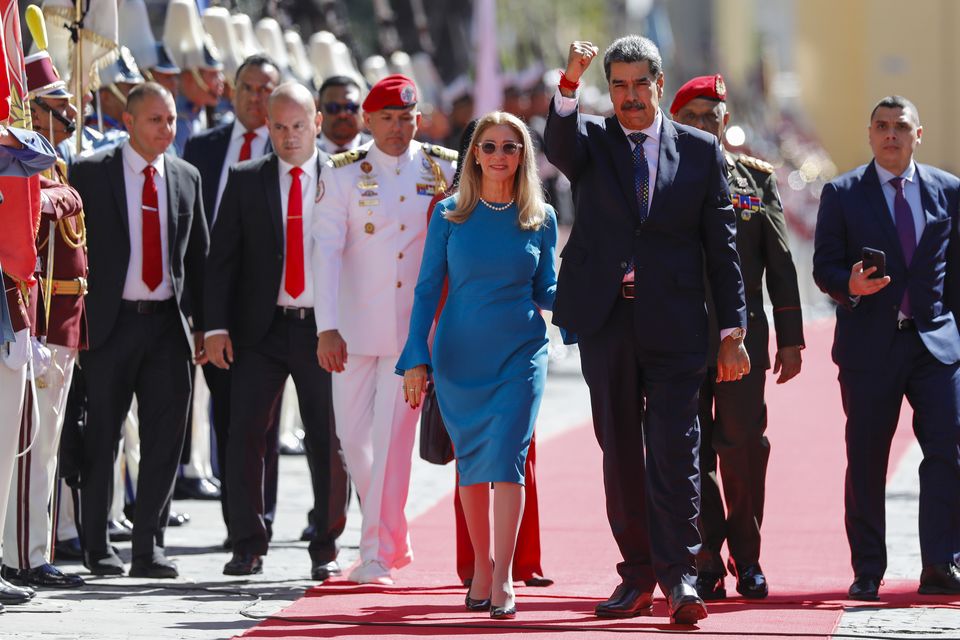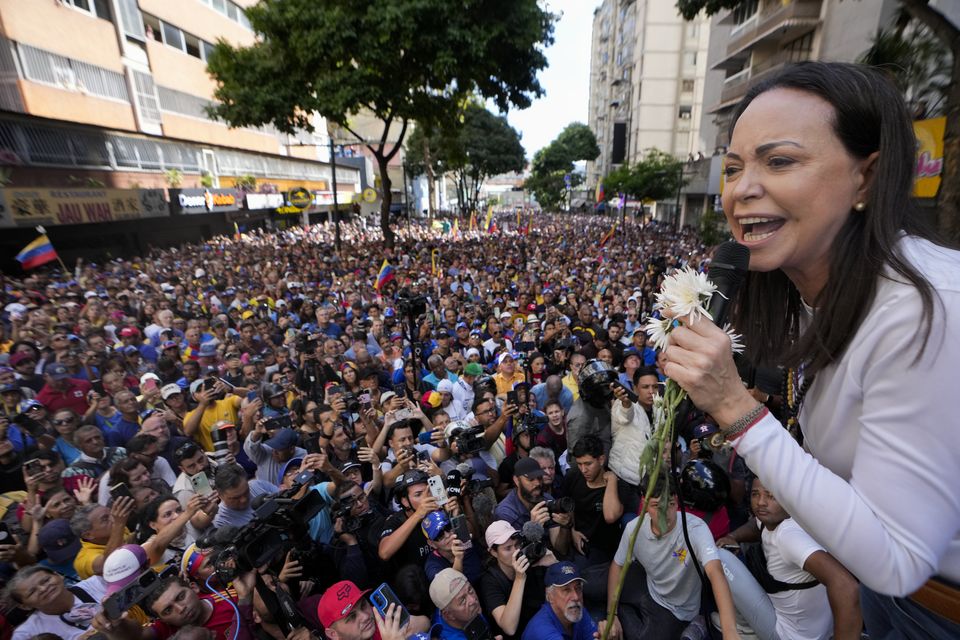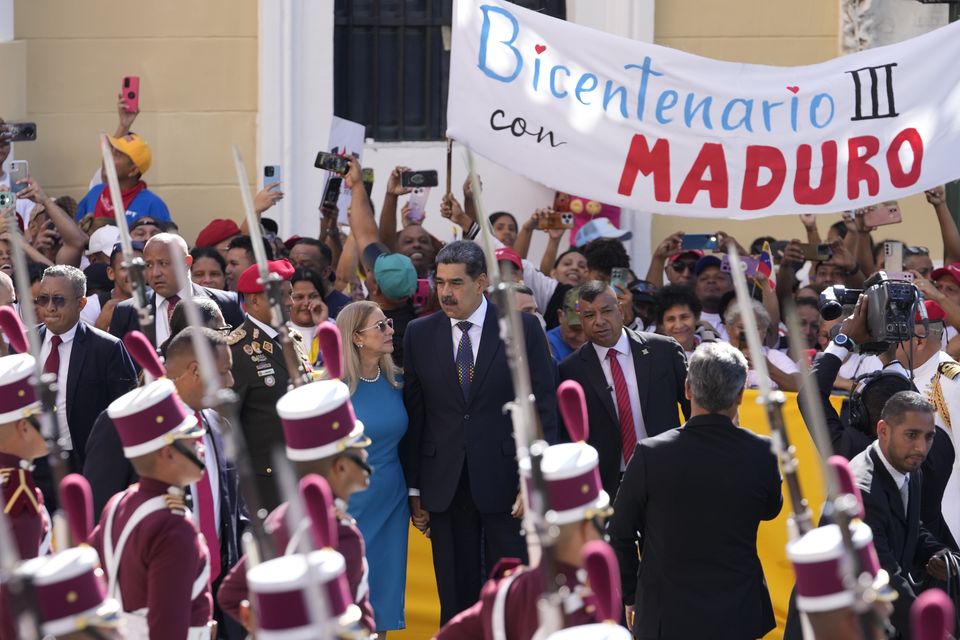President Nicolas Maduro extended his rule over Venezuela until 2031 when he was sworn in on Friday, despite credible evidence that his opponent won the latest election.
The swearing-in followed protests against his plan to serve a third six-year term.
Venezuela’s legislative palace, where Mr Maduro was sworn in, was heavily guarded by police, military and intelligence officers.
Crowds of people, many sporting pro-Maduro T-shirts, gathered in adjacent streets and a nearby plaza.
Venezuelan President Nicolas Maduro and his wife Cilia Flores arrive at the National Assembly for his swearing-in ceremony (Cristian Hernandez/AP)
Mr Maduro accused the opposition of trying to turn his inauguration into a “world war”, and said the faction’s failure to stop the inauguration was “a great Venezuelan victory”.
He accused external powers of “attacking” Venezuela, specifically the US government, and promised to guarantee “peace and national sovereignty”.
“Today more than ever I feel the weight of commitment, the power that I represent, the power that the constitution grants me,” he said.
“I have not been made president by the government of the United States, nor by the pro-imperialist governments of Latin America.”
On Thursday, as hundreds of anti-Maduro protesters took to the streets of the capital, Caracas, aides to opposition leader Maria Corina Machado said she was briefly detained by security forces and coerced into recording videos.
Ms Machado, whom the government has barred from running for office, had emerged from months of hiding to join the rally to demand that opposition candidate Edmundo Gonzalez be sworn in as president instead of Mr Maduro.
Ms Machado addressed the rally then left on a motorcycle with her security convoy.
Ms Machado’s press team later announced on social media that security forces “violently intercepted” her convoy.
Her aides then confirmed to The Associated Press that the opposition hardliner had been detained.
Leaders in the Americas and Europe condemned the government for suppressing opposition voices and demanded her release.
US President-elect Donald Trump expressed his support for Ms Machado and Mr Gonzalez.
“These freedom fighters should not be harmed, and MUST stay SAFE and ALIVE!” Mr Trump said on Truth Social.
Mr Maduro’s supporters denied that Ms Machado was arrested, saying government opponents were spreading fake news to generate an international crisis.
Maria Corina Machado addresses supporters during a protest against President Nicolas Maduro the day before his inauguration (Matias Delacroix/AP)
Electoral authorities loyal to the ruling party declared Mr Maduro the winner hours after polls closed on July 28, but unlike in previous presidential elections, they did not provide detailed vote counts.
The opposition, meanwhile, collected tally sheets from more than 80% of electronic voting machines, posted them online and said the tallies show Mr Gonzalez won twice as many votes as Mr Maduro.
Global condemnation over the lack of transparency prompted Mr Maduro to ask the country’s high court — also filled with allies of his United Socialist Party of Venezuela — to audit the election results.
The court reaffirmed Mr Maduro’s victory without providing thorough evidence and encouraged the electoral council to release the vote counts.
But neither the council nor the ruling party produced any evidence that Mr Maduro had won, even though their voting centre representatives also were entitled to tally sheets from every voting machine.
The US-based Carter Centre, which observed the election on the government’s invitation, declared the opposition-published tallies legitimate.
Other election experts that the government allowed to witness the vote said polling records published online by the opposition faction appear to exhibit all of the original security features.
The dispute over the results prompted international outrage and nationwide protests.
Venezuelan President Nicolas Maduro has been sworn in for a third term (Matias Delacroix/AP)
The government responded with full force, arresting more than 2,000 demonstrators and encouraging Venezuelans to report anyone they suspect to be a ruling-party adversary.
More than 20 people were killed during the unrest and many protesters reported being tortured in custody.
It is unclear whether any heads of state were planning to attend Friday’s inauguration ceremony hosted by the ruling party-controlled National Assembly at the legislative palace in Caracas.
Colombian President Gustavo Petro, a close Maduro ally, said he would skip the event citing the detentions earlier in the week of another longtime Venezuelan opposition member and a human rights defender.
Mr Maduro’s last inauguration, in 2019, was attended by Cuba’s President Miguel Diaz-Canel and then-Bolivian President Evo Morales.
The 2018 election was widely considered a sham after his government banned major opposition parties from participating.
And it remains unclear if Mr Gonzalez, who left for exile in Spain in September, will fulfil his promise to return to Venezuela by Friday.
Government officials have repeatedly threatened Mr Gonzalez with arrest should he step on Venezuelan soil.
On Tuesday, Mr Gonzalez said his son-in-law Rafael Tudares had been kidnapped in Caracas.
Mr Gonzalez’s daughter, Mariana Gonzalez de Tudares, suggested in a statement that the government was behind her husband’s disappearance.
“At what point did being related to Edmundo Gonzalez Urrutia become a crime?” she said.


